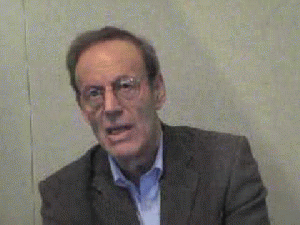Key to that disaster was the demonization of Saddam Hussein, who was subjected to such unrelenting propaganda that almost no one dared question the baseless charges hurled at him about hiding WMD and collaborating with Al Qaeda. To do so would have made you a "Saddam apologist" or worse.
The few who did dare raise their voices faced accusations of treason or were subjected to character assassination. Yet, even after their skepticism was vindicated as the pre-invasion accusations collapsed, there was very little reappraisal. Most of the skeptics remained marginalized and virtually everyone who got the WMD story wrong escaped accountability.
No Accountability
For instance, Washington Post editorial-page editor Fred Hiatt, who repeatedly reported Iraq's WMD as "flat fact," suffered not a whit and remains in the same prestigious job, still enforcing one-sided "group thinks" about "enemies."

The Power of Democracy In this interview with CIPE, Carl Gershman, President of the National Endowment for Democracy (NED), discusses past and current struggles for democracy ...
(Image by Center for International Private Enterprise (CIPE), Channel: Center for International Private Enterprise (CIPE)) Details DMCA
An example of how Hiatt and the Post continue to play the same role as neocon propagandists was on display last year in an editorial condemning Putin's government for shutting down Russian activities of the U.S.-funded National Endowment for Democracy and requiring foreign-funded groups seeking to influence Russian politics to register as foreign agents.
In the Post's editorial and a companion op-ed by NED President Carl Gershman, you were led to believe that Putin was delusional, paranoid and "power mad" in his concern that outside money funneled into non-governmental organizations was a threat to Russian sovereignty.
However, the Post and Gershman left out a few salient facts, such as the fact that NED is funded by the U.S. government and was the brainchild of Ronald Reagan's CIA Director William J. Casey in 1983 to partially replace the CIA's historic role in creating propaganda and political fronts inside targeted nations.
Also missing was the fact that Gershman himself announced in another Post op-ed that he saw Ukraine, prior to the 2014 coup, as "the biggest prize" and a steppingstone toward achieving Putin's ouster in Russia. The Post also forgot to mention that the Russian law about "foreign agents" was modeled after a U.S. statute entitled the Foreign Agent Registration Act. [See Consortiumnews.com's "Why Russia Shut Down NED Fronts."]
All those points would have given the Post's readers a fuller and fairer understanding of why Putin and Russia acted as they did, but that would have messed up the desired propaganda narrative seeking to demonize Putin. The goal was not to inform the American people but to manipulate them into a new Cold War hostility toward Russia.
We've seen a similar pattern with the U.S. government's "information warfare" around high-profile incidents. In the "old days' -- at least when I arrived in Washington in the late 1970s -- there was much more skepticism among journalists about the official line from the White House or State Department. Indeed, it was a point of pride among journalists not to simply accept whatever the spokesmen or officials were saying, but to check it out.
There was plenty of enough evidence -- from the Tonkin Gulf lies to the Watergate cover-up -- to justify a critical examination of government claims. But that tradition has been lost, too. Despite the costly deceptions before the Iraq War, the Times, the Post and other mainstream outlets simply accept whatever accusations the U.S. government hurls against "enemies." Beyond the gullibility, there is even hostility toward those of us who insist on seeing real evidence.
Examples of this continuing pattern include the acceptance of the U.S. government line on the sarin gas attack outside Damascus, Syria, on Aug. 21, 2013, and the shoot-down of Malaysia Airlines Flight 17 over eastern Ukraine on July 17, 2014. The first was blamed on Syria's Assad and the second on Russia's Putin -- quite convenient even though U.S. officials refused to present any solid evidence to support their claims.
Reasons for Doubt
In both cases, there were obvious reasons to doubt the Official Story. Assad had just invited United Nations inspectors in to examine what he claimed were rebel chemical attacks, so why would he pick that time to launch a sarin attack just miles from where the inspectors were staying? Putin was trying to maintain a low profile for Russian support to Ukrainians resisting the U.S.-backed coup, but provision of a large, sophisticated and powerful anti-aircraft battery lumbering around eastern Ukraine would just have invited detection.
Further, in both cases, there was dissent among U.S. intelligence analysts, some of whom objected at least to the rushes to judgment and offered different explanations for the incidents, pointing the blame in other possible directions. The dissent caused the Obama administration to resort to a new concoction called a "Government Assessment" -- essentially a propaganda document -- rather than a classic "Intelligence Assessment," which would express the consensus views of the 16 intelligence agencies and include areas of disagreement.
(Note: You can view every article as one long page if you sign up as an Advocate Member, or higher).





